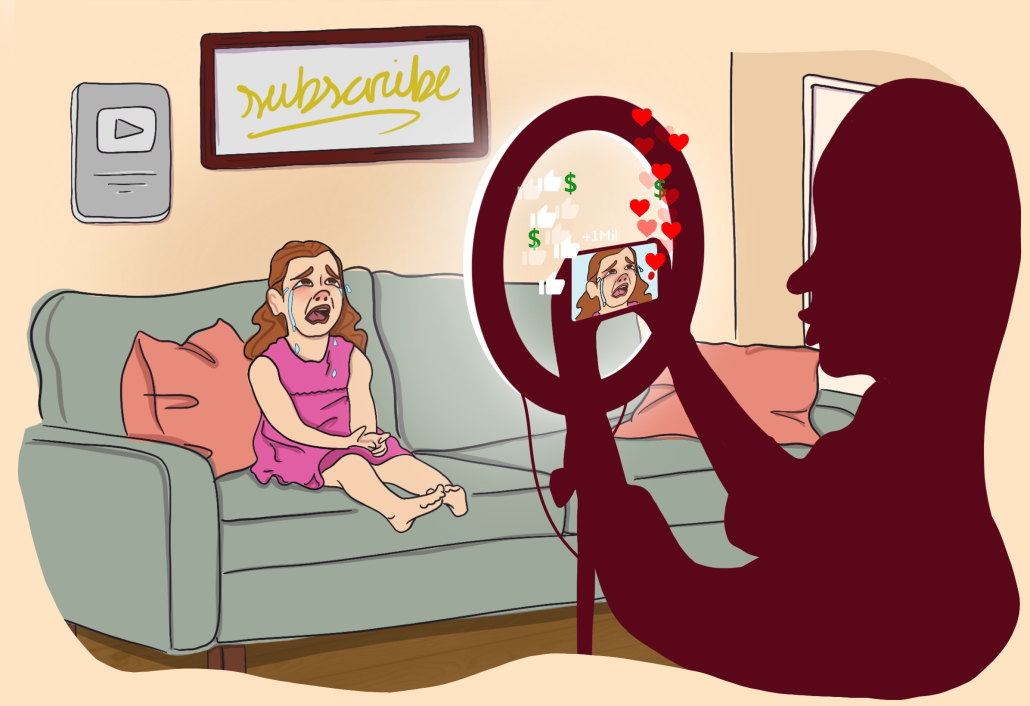Family influencers need to be demonetized ASAP

The psychological and behavioral repercussions of child stardom are well-documented. Miley Cyrus, Lindsay Lohan, Britney Spears — we can all think of a star raised in the limelight who subsequently suffered a very public breakdown. But is this mental and emotional turmoil the fate of child influencers? What will happen to the children who knew a camera lens before they knew how to walk? What sort of pressure does it cause child influencers to be the breadwinners of their families before they even understand the concept of income or fame?
The scary truth is that we don’t know the long-term psychological ramifications of being a child influencer yet. Psychologist Dr. Pamela Rutledge stated in an interview with Insider that child influencers run the risk of sacrificing their identity for the sake of fueling the perpetual content creation machine.
“It isn’t like somebody is giving you a part to play in or writing a script for you. You’re having to do this sort of creation all the time. At what point is it you, and at what point is it this persona you’ve created?” Rutledge said.
A family influencer lifestyle could complicate family dynamics and relationships as well. If a camera is always in the child’s face, how do they know when their parents are being genuine, and when they are performing? This only becomes more harrowing when we consider family influencers who regularly prank their children. How do you place trust in a parent who consistently violates that trust for views?
Even if we could set aside the argument about the psychological ramifications of fame during early stages of development, the predator argument simply rears its ugly head. According to an article by CNET, TikTok accounts primarily featuring young children are at risk of exposure to online predators. It begs the question — what could possibly outweigh a parent’s obligation to their child’s safety? Why is it that the risk of exposure to online predators and predatory behavior is not reason enough to shield children from the dangers of child influencership?
The CNET article also details the disturbing case of @wren.eleanor on TikTok — a family influencer known only as “Jacquelyn” who posts almost exclusively about her three-year-old daughter, Wren for an audience of over 17 million followers. Wren is one of many children whose photos dominate their parents’ social media feeds and are vulnerable as a result. Parents of child influencers can no longer feign ignorance of the risks either.
According to the CNET article, “Concerned onlookers have pointed Jacquelyn toward comments that appear to be predatory and have warned her that videos in which Wren is in a bathing suit, pretending to insert a tampon or eating various foodstuffs have more watches, likes and saves than other content.” These concerns have seemingly been brushed aside, as the page is still publicly available.
This unique vulnerability to strangers isn’t staying online either. According to CNET, family influencer Rachel Barkman made the decision to keep her three-year-old son’s face off the Internet after a real-life encounter in the forest. Barkman had been posting TikTok content exhibiting her son’s prowess for mushroom picking until a stranger came up to Barkman and her son, calling the child by name and asking him about mushrooms.
“I immediately went cold at the realization that I had equipped complete strangers with knowledge of my son that puts him at risk,” Barkman said.
While some might hesitate to say that online predators compromise a child’s safety in the real world, cases like this prove that child influencers aren’t safe online or in real life. Public social media accounts that freely share a child’s name, likes, hobbies, skills and face are actively equipping strangers with the personal information most likely to lower a child’s guard in a face-to-face encounter.
Parents that are willing to exploit their children’s privacy and well-being for internet fame and monetary gain don’t seem inclined to stop once their child is grown; TikTok star Addison Rae is a great example of teen-turned-adult stars still haunted by the managerial presence of a parent. According to NBC News, Addison Rae’s father, Monty Lopez, is still attempting to profit off of his adult daughter’s fame. Lopez established an agency for TikTok stars, despite sources close to Lopez telling NBC that “Lopez was not responsible for Rae’s deals and opportunities and sought to take advantage of her success.”
The privacy that was once a right all children enjoyed has been rendered a commodity for certain parents to capitalize on. Until widespread legislation or demonetizations occur across platforms like YouTube, Instagram and TikTok, private childhoods will gradually become a luxury of the past.
Above all, we must advocate for the demonetization of all public social media accounts that predominantly feature children. Children are not performers. They do not have a strong sense of identity that can withstand the duality of performing online and existing in the household simultaneously. We need to collectively reckon with the fact that exchanging a child’s personal life for daily exposure and profit is a form of abuse. This is not an issue that can be solved by banning only the extreme, highly visible cases of child abuse. The parents are stealing their child’s safe place and home by converting it into a stage accessible by millions, from which there is no break or time off.

